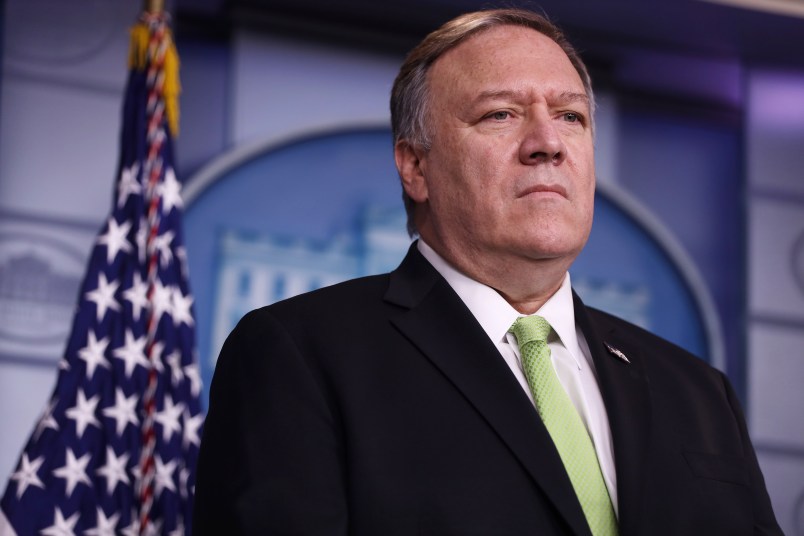A lengthy new report pokes yet more holes in the Trump administration’s already-dubious claims that it needed to kill a top Iranian general in order to prevent an “imminent” threat.
The general, Qassem Soleimani, was killed by a done strike outside Baghad International Airport last Friday.
The administration has argued that Soleimani’s killing was necessary to prevent an “imminent” attack, but its changing rhetoric about the danger Soleimani posed has weakened its case.
Secretary of State Mike Pompeo, for example, said Thursday that “we don’t know precisely when and we don’t know precisely where” the supposedly imminent attack, or attacks, plotted by Soleimani would’ve occurred.
“Soleimani was actively planning new attacks, and he was looking very seriously at our embassies, and not just the embassy in Baghdad,” President Trump said in an interview with Fox News’ Laura Ingraham aired Friday, adding: “I believe it probably would’ve been four embassies.”
That was the first time the administration had offered that detail.
Meanwhile, a lengthy report from The New York Times published Saturday matched multiple outlets’ reporting that Soleimani’s killing was one of a number of options presented to Trump as a response to the storming of the U.S. embassy compound in Baghdad by an Iranian-backed militia.
One unnamed State Department official told the Times it was “a mistake” for Pompeo to refer to the purported attack being plotted by Soleimani as “imminent.”
At the CIA, officers referred to a “mosaic effect” of information about a large-scale attack Soleimani was planning that targeted American assets.
But several unnamed officials told the Times that there was not sufficient information to describe the threat as “imminent.”
Other unnamed officials told the Times there was no specific intelligence supporting Pompeo’s claim that the attack could’ve killed “hundreds” of people.
The administration’s classified briefings to members of Congress about the Soleimani killing — which Sen. Mike Lee (R-UT) called “the worst briefing” on a military issue he’d seen — was similarly fraught.
In the briefings, several top Trump administration officials attempted to sell Congress on the imminent threat Soleimani posed, but many legislators left unconvinced after the briefers skimped on detail.
At one point, Gen. Mark Milley, chairman of the Joint Chiefs of Staff, reportedly listed three specific dates on which Soleimani had discussed potential attacks.
“What were the threats?” lawmakers shouted, per the Times. Milley didn’t say.
One lawmaker, unnamed in the report, noted that the dates Milley listed, in late December or early January, had passed before Soleimani’s killing without any attacks.







Giuliani’s three “words”:
A noun, a verb, and 9-11
Pompeo’s three words:
“We don’t know…”
From the reporting (I’m assuming too few people can access it). This act which no one is cheering but in fact are protesting on the streets will not help a president who’s never had 50% approval rating (currently 41.8 according to fivethirtyeight.com) which is what it takes to be reelected.
Not my circus, not my monkeys!
The tide’s shifting, Donnie…
More please…
It appears Soleimani was Pompeo’s white whale -a guy he’s wanted for many years and finally was able to get by convincing an ignorant President it was the way to go.
Along with Pompeo, Pence and Haspel were on board; none of whom I trust, although Haspel did correct predict Iran’s (initial) response.
Soleimani was obviously a bad guy, but nowhere in that deep dive of an article is there any mention of anyone thinking about secondary and tertiary consequences that would inevitably arise.
I’ll give the American people credit here. The majority have a great unease about what occurred here and don’t trust Trump at all in regards to conducting any possible war.
This Administration, when it thinks at all, only thinks in the short-term. But it’s the longer term consequences that should keep us awake. It’s not as if the Middle East needed any more instability.